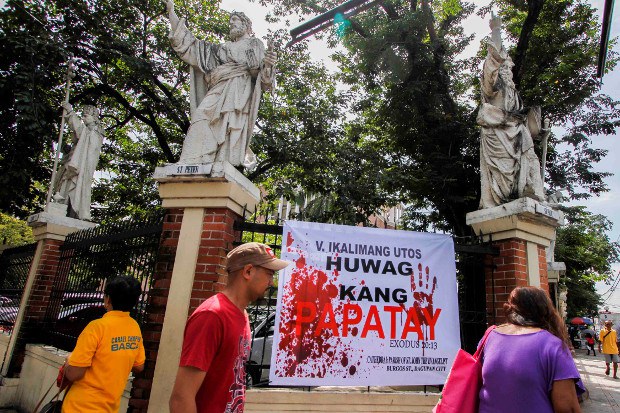Philippines Hits Back at EU Parliament Over Drug-War Complaint
2018.04.20
Manila
 Pedestrians pass a Tagalog sign bearing one of the 10 Commandments, “Thou shalt not kill,” in Dagupan, Philippines, in September 2016.
Pedestrians pass a Tagalog sign bearing one of the 10 Commandments, “Thou shalt not kill,” in Dagupan, Philippines, in September 2016.
Philippine officials shot back at the European Parliament on Friday, telling the EU’s legislative body to stop interfering with their country’s domestic affairs after it issued a strongly worded statement that questioned President Rodrigo Duterte’s war on drugs.
Presidential spokesman Harry Roque reiterated that the Duterte administration did not engage in extrajudicial killings and he challenged human rights groups to produce the bodies of the thousands of victims they said they had documented.
“We of course find it unfortunate that members of the European Parliament once again interfered with the affairs of the Philippines state, rehashing issues and baseless claims that have been explained adequately by the Philippine government in official statements,” Roque said.
The Philippine National Police said the number of alleged drug dealers and addicts killed had reached at least 4,043 since Duterte became president in 2016. But Human Rights Watch and other groups said the figure could actually be higher than 12,000, with many of the deaths blamed on vigilantes who support police efforts.
“We of course challenge them. Where is the data, where is the evidence that 12,000 have been killed,” Roque said. “Impunity doesn’t have a place in our society and we continue to follow due process and hold officers accountable for their actions.”
In a resolution on Thursday, the European Union’s parliament urged Manila to end the killings it said were being carried out on the pretext of the drug war. The legislature also said it was alarmed with what it described as the Philippine police force’s penchant to falsify evidence to justify the killings.
The European Parliament also called for the immediate release of Leila de Lima, a Philippine senator who has been the leading critic of Duterte’s drug war. She was arrested last year on what she claimed were trumped up charges of profiting from the drug trade.
The justice secretary who had jailed her was recently forced to quit after a drug trafficker who was among the accusers of de Lima was cleared of charges.
On Friday, Roque said de Lima’s arrest was a matter for the courts to decide, noting that the country’s highest court had already said that the information against the senator was with basis and should continue.
“Our justice system works here in the Philippines, and cannot be influenced by politics,” Roque said. “We hope that whatever is the norm in Europe, will also be observed here in the Philippines. The executive branch does not influence the judiciary.”
The parliamentary resolution also asked the European Commission and the External Action Service to “initiate procedural steps which could lead to the temporary withdrawal” of GSP-plus for the Philippines. The GSP, or General Scheme of Preferences, offers tax incentives to developing countries.
This was not the first time that the Philippines and European Union clashed over the drug war. In May 2017, Duterte said his government would no longer accept EU aid because he said it came with conditions to improve human rights and the rule of law.
Foreign Secretary Alan Peter Cayetano said the parliament had crossed a red line with its recent statement, which also criticized the government for including Victoria Tauli-Corpuz, the U.N.’s special rapporteur on the rights of indigenous people, on its list of terrorist communists.
Roque, an international rights lawyer before joining the government, said Corpuz would be given a chance to be heard.
“She should submit evidence that she is not a terrorist and we would let the courts decide,” Roque said.
Roque said the Philippines and Europe had mechanisms for “constructive discussions” where sensitive issues such as this could be discussed.
Additionally, Roque said he found it odd that the parliamentary resolution also came at a time when the EU “has given us financial assistance in the ongoing war against drugs.”
“We thus call on the members of the European Parliament to exercise prudence in issuing resolutions,” he said. “We understand a number of whom we have close ties with the local political opposition who tried to distort realities that we have a working democracy, where people now enjoy peace and order.”







